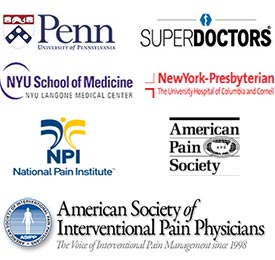NYC Myofascial Pain Syndrome Diagnosis & Treatment Specialist Doctors
At Manhattan Pain and Sports Associates you’ll get the myofascial pain syndrome pain management and doctor’s care you need to reduce or eliminate your myofascial pain syndrome pain. Because when you’re in pain — whether it’s from an accident, age, sporting injury, or ailment — you want relief quickly. Appropriate and targeted myofascial pain syndrome pain management and treatment starts with a proper diagnosis from your NYC pain management specialist.
Myofascial Pain Syndrome (MPS)
Fascia refers to the soft tissue that connects and covers your muscles. When you experience muscle pain, you may be suffering from a painful condition called myofascial pain. MPS, or myofascial pain syndrome, is a chronic illness commonly caused by inflammation in your connective tissues.
You may feel MPS pain in one whole muscle group, or it could be centralized in a single muscle. Sometimes, the area that hurts the worst is not where the actual fascia inflammation is located. This happens when the spot that was injured triggers pain in other areas, which is known as referred pain.
Myofascial Pain Syndrom Causes and Effects
People in Manhattan are prone to myofascial pain syndrome when they exert excessive strain on a ligament, muscle or tendon. Although athletes are more liable to have MPS, anyone can get it if they put enough stress on their muscles. The pain can occur due to:
- A lack of activity, such as when you must keep your arm in a sling
- Repetitive motion activity
- Tiredness and fatigue
- Damaged back discs
- Other medical conditions such as a heart attack or irritable bowel syndrome (IBS)
You feel myofascial pain in the tender spot, or trigger point, where the injury or strain occurred or in the place where you first noticed symptoms. Whenever you touch the trigger point or apply pressure of any kind to it, you may experience worsening pain. While this condition may not lead to further complications, you should discuss your options with an NYC pain management doctor because side effects of MPS may interrupt your daily activities. These can include:
- Anxiety
- Depression
- Lack of appetite
- Fatigue
- Other behavioral changes
Myofascial Pain Syndrom Treatment Options
Your pain management specialist may rely on treatment such as antidepressants to resolve the side effects of the chronic pain while you undergo direct treatment of the trigger point. A number of options are available — and they always include physical therapy and a prescribed exercise regimen.
Your NYC pain management doctor may use a spray coolant on your painful trigger points, followed by a massage to stretch out the fascia. This technique is especially useful when your sensitivity to touch is increased. When you can bear it, massage therapy can be useful to target painful areas.
Trigger point injections may be incorporated, and your doctor may inject anesthesia directly into the sore spot. A combination of anesthetic injections, massage and physical therapy often can reduce your pain. Treatment for your myofascial pain syndrome may be only moderately successful, but the experts at Manhattan Pain and Sports Associates can reduce your chronic pain.
Self-Care Is Important
When you live with chronic pain, it’s important to take care of yourself at all times by:
- Eating a healthy nutritious diet
- Relaxing
- Exercising regularly
- Talking about your feelings
Ask your doctor about pain management support groups, online discussions or other support options to help you deal with your challenges.
Get the Pain Relief You Need
Your NYC myofascial pain syndrome pain management doctor’s goal is to get you back to your normal routine with minimal downtime. After your myofascial pain syndrome diagnosis is confirmed, your doctor begins your pain management and treatment plan with the most conservative pain relief treatment. You’ll always receive non-invasive pain relief before your doctor turns to more invasive procedures like surgery.
Manhattan Pain and Sports Associates
51 East 25th St, 4th Floor, Ste B
New York, NY 10010
(212) 533-3954



